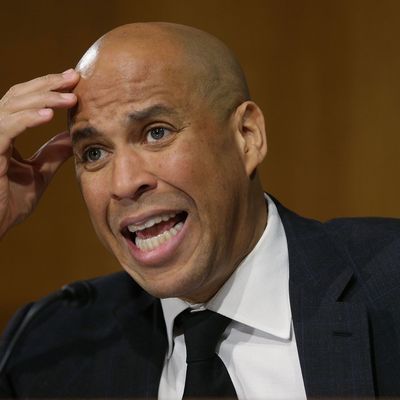
It’s not often that a late-night procedural vote on a non-binding amendment to a non-binding budget resolution becomes the source of red-hot intra-party conflict. But that’s what is happening today as the word spreads that 13 Senate Democrats voted against a Bernie Sanders/Amy Klobuchar amendment encouraging importation of prescription drugs from Canada, while 12 Republicans voted for it.
The vote was actually one to waive a point of order against the Sanders-Klobuchar amendment for being non-germane to the bare-bones budget resolution it sought to amend. So the 46–52 margin by which it failed was actually 14 votes short of what the sponsors needed for success. Thus it failed like the other 16 amendments voted on during the Kabuki theater of the budget resolution “vote-a-rama,” a high-speed series of votes engineered by Senate Democrats to get Senate Republicans on record for casting unpopular or party-dividing votes.
It would be ironic to say the least if last night’s votes instead exposed Senate Democrats to opprobrium. But that is what may be happening as progressives excoriate the 13 Democratic “turncoats” (Bennet, Booker, Cantwell, Carper, Casey, Coons, Donnelly, Heinrich, Heitkamp, Menendez, Murray, Tester, Warner) who voted no on the Sanders-Klobuchar measure. It did not take critics too long to unearth the campaign contributions some of these Democrats received from pharmaceutical companies:
Between 2010 and 2016, a handful of the Democratic senators who voted “nay” were amongst the top Senate recipients funded by pharmaceutical companies: Sen. Booker received $267,338; Sen. Patty Murray (D-WA) received $254,649; Robert Casey (D-PA) received $250,730; Michael Bennet (D-CO) received $222,000.
In any event, it’s reasonably clear that there are two factors mainly affecting the reaction to the otherwise obscure vote last night. The first is that just yesterday Donald Trump attacked pharmaceutical companies and called for government negotiation of drug prices (an idea nearly all Republicans oppose now as they did in 2007), raising the issue’s visibility. And the second is that Cory Booker — who is being singled out for the most outspoken criticism by progressives this morning — was getting a lot of Democratic love for his remarks (also yesterday) at Jeff Sessions’s confirmation hearings.
It’s no secret that Cory Booker, who has been a “rising star” favorite of Democratic centrists since he took on old-school liberal Newark mayor Sharpe James back in 2002, probably sees a future president of the United States in the mirror each morning. On the Democratic Left, the prospect of Booker’s rise to the top causes a lot of angst because of his close relationship to Wall Street and his heresies on a few key issues like school vouchers. Taking him down a peg this very week for allegedly serving the interests of another hated big-money lobbying titan, Pharma, makes perfect sense politically.
More broadly, the vote last night raises a perennially difficult issue for both parties: How much slack should they give individual members of Congress for representing home-state interests? There are an awful lot of pharmaceutical companies based in Cory Booker’s New Jersey, which also views nearby Wall Street as something of a constituent. Is supporting Pharma on votes like the one last night inherently any different than opposing Pharma because you represent people who can see how much cheaper drug prices are within close driving distance of your home? However you answer that question, it is increasingly clear Booker needs to do something that looks like a clear declaration of independence from his donors. Otherwise his very name will become a spark igniting an ideological fight in his party.






























